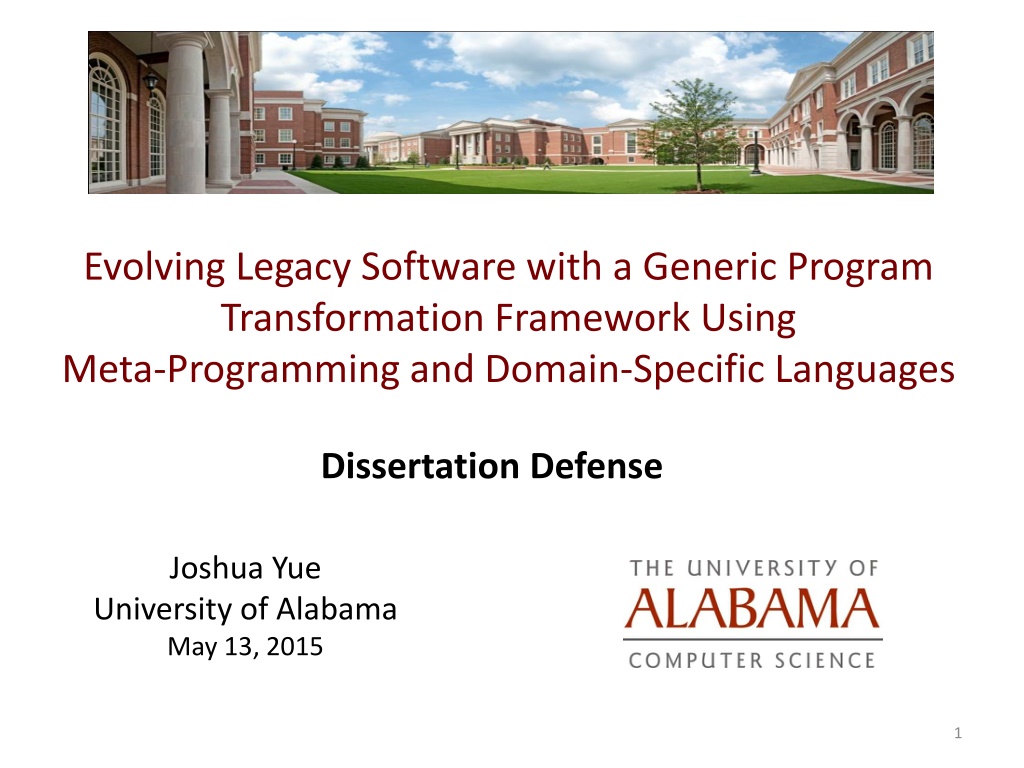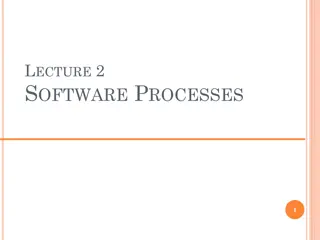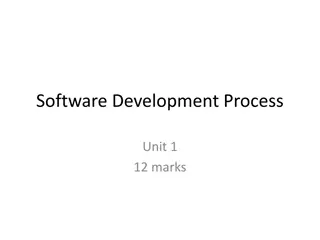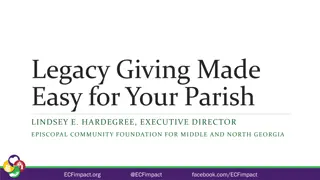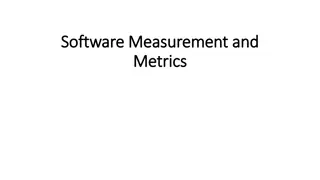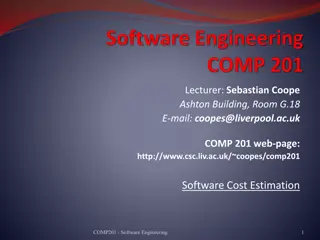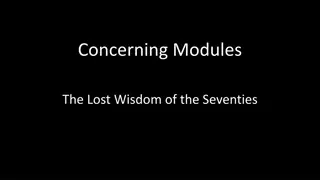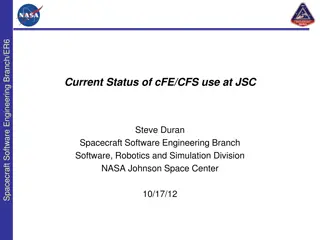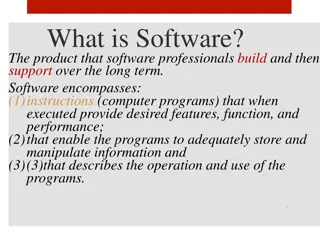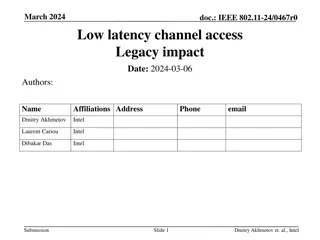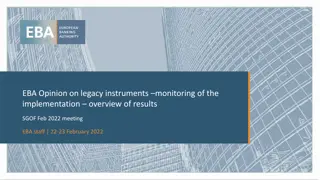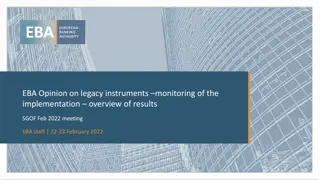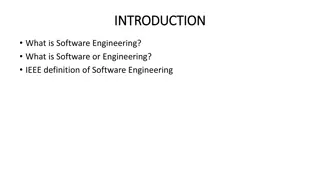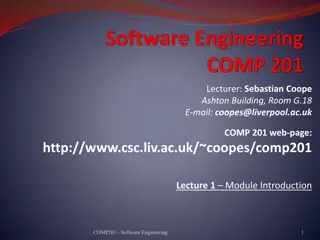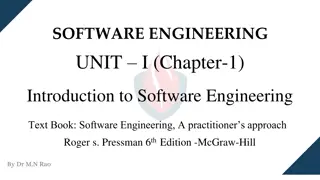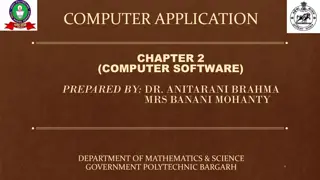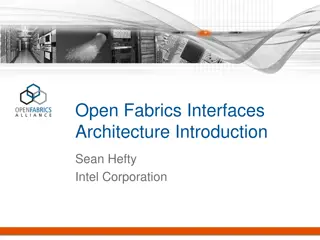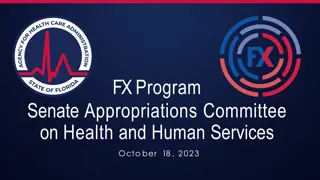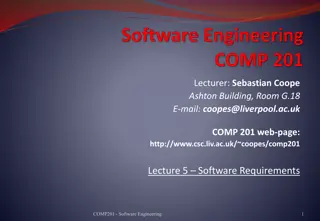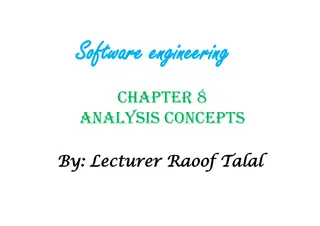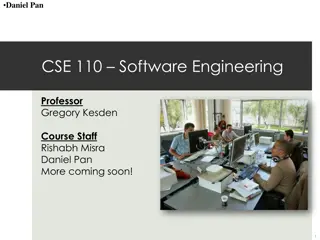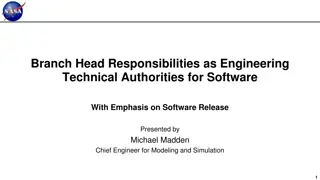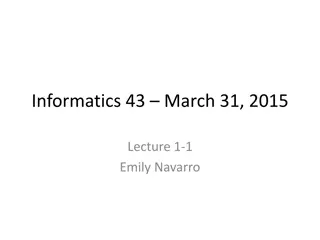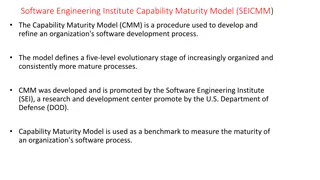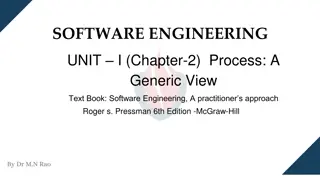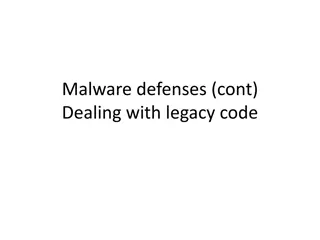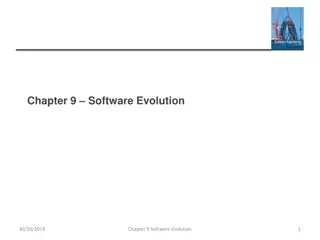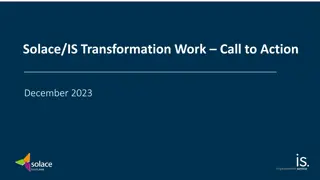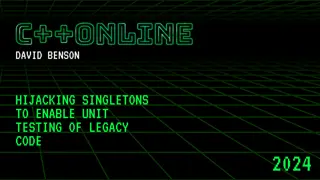Evolving Legacy Software with Program Transformation Framework
Dissertation defense by Joshua Yue on evolving legacy software using meta-programming and Domain-Specific Languages. Focus on High Performance Computing (HPC), challenges of parallel programming, and implementing utility functions. Research objectives include facilitating software development and maintenance by separating sequential, parallel, and cross-cutting concerns.
Download Presentation

Please find below an Image/Link to download the presentation.
The content on the website is provided AS IS for your information and personal use only. It may not be sold, licensed, or shared on other websites without obtaining consent from the author. Download presentation by click this link. If you encounter any issues during the download, it is possible that the publisher has removed the file from their server.
E N D
Presentation Transcript
Evolving Legacy Software with a Generic Program Transformation Framework Using Meta-Programming and Domain-Specific Languages Dissertation Defense Joshua Yue University of Alabama May 13, 2015 1
High Performance Computing (HPC) Provides solutions to problems that demand significant computational power e.g., weather prediction systems, Geographic Information Systems (GIS) A vast body of legacy code in HPC Fortran and C code Software that is being used must be continually adapted or it becomes progressively less satisfactory. -- Manny M. Lehman
Two Major Categories of Software Maintenance and Evolution Parallelization Parallelizing sequential code with parallel programming models, e.g., MPI, OpenMP, and CUDA Utility functions Logging Profiling Checkpointing
Challenges of Parallel Programming Tedious and error-prone to manually parallelize sequential code Programming models necessitate invasive reengineering of existing programs for inserting parallel code Difficult to evolve parallel applications Core logic code is often tangled with the code to accomplish parallelization Separate management of sequential and parallel code 6
Challenges in Implementing Utility Functions Utility functions Crosscutting concerns Represent a considerable amount of the total LOC Implement in a modularized manner without damaging the overall performance of the program Timer Implementation in NAS parallel benchmarks 7
The Primary Research Objective To facilitate the process of software development and maintenance using meta-programming and Domain-Specific Languages (DSLs) Separate sequential and parallel concerns Separate cross-cutting concerns Main contributions OpenFortran/OpenC SPOT OpenFoo [1] Yue, S. (2013). Program transformation techniques applied to languages used in high performance computing. In Proceedings of the 2013 companion publication for conference on Systems, programming, & applications: software for humanity (pp. 49-52). 8
Domain-Specific Languages (DSLs) Offer expressive power focused on a particular problem domain VS. general-purpose programming languages (GPLs) Provide appropriate abstraction and notations e.g., HTML, SQL, and LaTex 10
Meta-Object Protocol (MOP) Meta-programming A technique for writing programs that generate or manipulate other programs MOP A powerful tool to extend a programming language by providing the ability of meta- programming Organizes a meta-level architecture Provide interfaces to access the internal implementation of a program CLOS, OpenC++, and OpenJava 11
Meta-Object Protocol (MOP) Meta-level program and base-level program Meta-object and meta-class Meta-Level Program Class Base-Level Program Function 12
OpenFortran A framework to build arbitrary source-to- source program transformation libraries and tools for Fortran programs [2] Control over compilation rather than over the run-time execution Transformation Engine ROSE: Open Source Compiler Infrastructure [2] Yue, S., & Gray, J. (2013). OpenFortran: Extending Fortran with Meta-programming. In the companion publication for The International Conference for High Performance Computing, Networking, Storage, and Analysis, SC2013. 14
The Transformation Process Using OpenFortran Meta-level Transformation Code Open- Fortran Common Fortran Parser Extended Fortran Code Base-level Fortran Code Rose 15
Built-in Meta-Classes in OpenFortran Meta-Class Transformation Scope MetaFunction Program, function, subroutine, subprogram MetaModule Module MetaClass Derived type MetaGlobal Project 16
Member Functions in MetaObject ofExtendDefinition() transform the definition of language Constructs ofExtendFunctionCall(string funName) manipulate a function invocation where it is called ofExtendVariableRead(string varName) intercept and translate the behavior of a variable read ofExtendVariableWrite(string varName) intercept and translate the behavior of a variable write 17
Timer Implementation in NAS NAS: NASA Advanced Supercomputing NAS parallel benchmarks (NPB-3.2) Timer measures the execution time between any two points in the program Function calls timer_start timer_end timer_read 18
A Code Snippet in EP (Embarrassingly Parallel) program EMBAR call mpi_barrier(MPI_COMM_WORLD, ierr) call vranlc(2 * nk, t1, a, x) end program 19
Desired Transformed Code call timer_start(1) call mpi_barrier(MPI_COMM_WORLD, ierr) call timer_stop(1) call print *, mpi_barrier , timer_read(1) call timer_start(2) call vranlc(2 * nk, t1, a, x) call timer_stop(2) call print *, vranlc , timer_read(2) 20
class TimerEPMetaClass: public MetaFunction { Timer Implementation in NAS public: TimerEPMetaClass(string name); virtual bool ofExtendDefinition(); } 21
1. bool TimerEPMetaClass::ofExtendDefinition(){ 2. timerId = 1; 3. for(int i=0; i<funCallList.size(); i++, timerId++){ 4. SgStatement* targetStmt = getStmtsContainFunctionCall(funCallList[i]); 5. insertStatementBefore(targetStmt, buildFunctionCallStmt("timer_start",\ buildParaList(to_string(timerId)))); 6. SgStatement* targetStmtStop = insertStatementAfter(targetStmt,\ buildFunctionCallStmt("timer_stop",\ buildParaList(to_string(timerId )))); 7. insertStatementAfter(targetStmtStop, buildFunctionCallStmt("print", \ buildParaList( * , funCallList[i]->getName(),\ buildFunctionCallStmt( timer_read , buildParaList(to_string(timerId ))))))); 8. } 9. } 22
Transformed Code with Timer Implementation call timer_start(1) call mpi_barrier(MPI_COMM_WORLD, ierr) call timer_stop(1) call print *, mpi_barrier , timer_read(1) call timer_start(2) call vranlc(2 * nk, t1, a, x) call timer_stop(2) call print *, vranlc , timer_read(2) 23
Apply Transformations to Base Code program EMBAR MetaFunctionTimerEPMetaClass call mpi_barrier(MPI_COMM_WORLD, ierr) call vranlc(2 * nk, t1, a, x) end program 24
OpenC Meta-level Transformation Code OpenC MOP Common C Parser Extended C Code Base-level C Code Rose [5] Yue, S., & Gray, J. (2015). Extending C with Computational Reflection. 24th International Conference on Software Engineering and Data Engineering, SEDE2015. (in preparation) 25
A Short Summary Benefits of MOPs Cross-cutting concerns Less invasive Convenient to apply Challenges of MOPs The steep learning curve The difficulty of understanding the complex details of meta-programming and program transformation 26
SPOT: A DSL for Specifying PrOgram Transformations Design goal Toprovide language constructs that allow developers to perform direct manipulation on programs and hide the accidental complexities of using a MOP [3] Design decisions High-level programming concepts, e.g., functions, variables, statements and classes as language constructs of SPOT Facilitate systematic transformations, such as insert, delete, move and update [3] Yue, S., & Gray, J. (2014). SPOT: A DSL for Extending FORTRAN Programs With Meta-Programming. Advances in Software Engineering, Volume 2014, pp. 1-23 28
SPOT Language Constructs Language constructs File, Function, Statement, FunctionCall, VariableAccess Location and scope patterns Within(Construct con){Patterns/Actions} After/Before(Construct con){Patterns/Actions} FORALL(Construct con){Patterns/Actions} WildCard: *, %varName, $varName Actions AddCallStatement(<loc>, <targetStmt>, <funName>, <parameterList>) RenameVariable(<oldName>, <newName>) Function <fun> = GetFunction(<name>) 29
Overview of the Transformation Process with SPOT Antlr + StringTemplate Code Generator Transformation Specified in SPOT Meta-level Transformation Code Open- Fortran Transformed Fortran Code Original Fortran Code Rose 30
Code Generator Design Structure Code Generator SPOT Grammar Parser Transformation Specified in SPOT generated with Antlr Fortran Grammar Template Store StringTemplate Meta-level Transformation Code 31
Case Studies Supporting aspect-oriented programming A profiling tool Separating sequential and parallel concerns An OpenMP library Supporting extension for new application domains A checkpointing tool 32
Supporting AOP Profiling A technique to gain an overview of system performance A cross-cutting concern Scattered in multiple modules 33
A Program to Be Profiled PROGRAM exampleProg USE profiling_mod IMPLICIT NONE REAL a, b, c, result REAL calculation CALL profiling( exampleProg:Input ) CALL Input(a, b, c) CALL profiling( exampleProg:Input ) CALL profiling( exampleProg:Calc ) result = Calc (a, b, c) CALL profiling( exampleProg:Calc ) END 34
1. Transformer Profiling{ 2. Within(File *){ 3. FORALL(Function %fun){ 4. AddUseModuleStatement(profiling_mod); 5. FORALL(FunctionCall %funCall){ 6. AddCallStatement(Before, $funCall.statement, profiling, $fun.funName+ : +$funCall.funName); 7. AddCallStatement(After, $funCall.statement, Profiling, $fun.funName+ : +$funCall.funName); 8. } 9. } 10. } 11.} SPOT code implementing the profiling tool 35
Separating Sequential and Parallel Concerns OpenMP A parallel model for developing multithreaded programs in a shared memory setting C, C++ and Fortran An OpenMP library Assist in instrumenting OpenMP directives to parallelize sequential code Dijkstra s minimum graph distance algorithm 36
Actions for Inserting OpenMP Directives OmpUsePair(<directive>, <startStmt>, <endStmt>, <clauses>) e.g., PARALLEL OmpUseSingleBefore/After (<directive>, <targetStmt>, <clauses>) e.g., BARRIER OmpGetEnVariable(<name>, <var>) e.g., OMP_GET_NUM_THREADS 37
Supporting Extension for New Application Domains Checkpointing Provide fault-tolerance Save a snapshot of critical data periodically to stable storage Restore the execution in case of failure Extended SPOT to support checkpointing for Fortran applications 38
Constructs Added for Checkpointing Start checkpointing StartCheckpointing(<location>, <statement>) CKPSaveInteger(<variable name>) Restore StartInitializing(<location>, <statement>) CKPReadInteger(<variable name >) Additional features CKPFrequencey(<number>) CKPType(<Checkpointing Type>) 39
A Short Summary Express program transformations in terms of design intent rather than the underlying implementation Higher-level abstraction Underlying transformations are transparent Flexible to generate to different languages of implementation At compile-time No harm to run-time performance 40
A Generic Framework for Extending Arbitrary GPLs with a MOP OpenFoo: an Extensible MOP Construction Approach Generalizing SPOT to Support New MOPs 42
OpenFoo: an Extensible MOP Construction Approach There is a general lack of infrastructure support for language extension in terms of building a MOP for an arbitrary language OpenFoo: an extensible prototype Language-independent Allows reusing artifacts and source code Models of MOP construction to assist extension Fortran 90 and C++ OpenCpp to differentiate form OpenC++ 43
The Transformation Process Using OpenFoo [5] Yue, S., & Gray, J. (2015). OpenFoo: A Generalized Framework for Extending a Language with Meta- Object Protocols. Target Journal: Computer Languages, Systems and Structures. (In preparation) 44
Extending ConcreteSyntax of SPOT actionStatement : 'AddStatement' '(' locationKeyWord, target=statement, new=statement ')' -> ^('AddCallStatement' locationKeyWord $target $new) |'ReplaceStatement' '(' oldStmt= statement',' newStmt= statement')' -> ^('ReplaceStatement' $oldStmt $newStmt) |'DeleteStatement' '(' statement ')' -> ^('DeleteStatement' statement) |'AddIncludeStatement' '(' ID .h ')' -> ^('AddIncludeStatement' ID) |'AddNewStatement' '('TYPENAME ID ')' -> ^('AddNewStatement TYPENAME ID); statement : assignmentStatement -> ^(ASSIGN_STATEMENT assignmentStatement) | callStatement -> ^(CALL_STATEMENT callStatement) | declareStatement -> ^(DEC_STATEMENT declareStatement) | ifStatementWhole -> ^(COND_STATEMENT ifStatementWhole) | doStatement -> ^(DO_STATEMENT doStatement) | whileStatement -> ^(WHILE_STATEMENT whileStatement) | forStatement -> ^(FOR_STATEMENT forStatement) | switchStatement -> ^(SWITCH_STATEMENT switchStatement) ;
